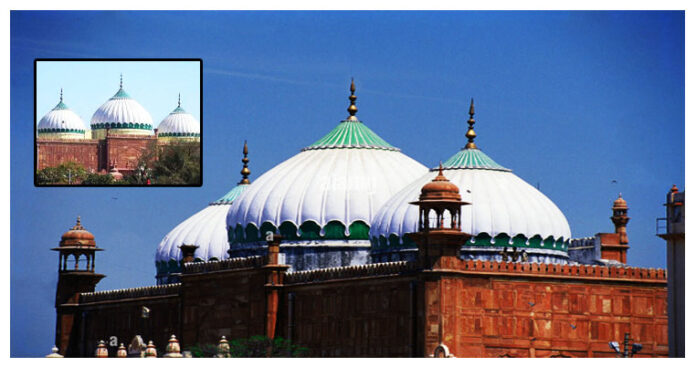Hard-line Hindu groups have been filing petitions in court to stop Muslims from entering Shahi Eidgah Mosque in Mathura, India. It is an extension of a plea they made in 2020 seeking the court’s approval to find any Hindu relics which may be present on the site. Now they are asking the court to make sure no Muslim enters the mosque until the survey is complete.
The local court in a Hindu majority town approved the latest petitions but did not clarify when it would issue permission to survey inside the historical mosque.
Extremists Claim Shahi Eidgah Mosque is a Birthplace of Hindu Deity
The court reportedly received 10 separate petitions asking to “remove” Shahi Eidgah Mosque. They claimed that Lord Krishna was born here and once there was also a temple. Their lawyer questioned its legitimacy, saying that since it had been built at the place of the temple, it did not qualify as a mosque.
Extremist groups believe that there are Hindu idols inside this mosque, and Muslims will remove them if the court does not stop them from offering prayer there. Many other extremist groups linked with Prime Minister Narendra Modi’s BJP (Bhartiya Janata Party) claim that Islamic invaders have destroyed Hindu temples during their 200-year rule in India.
Such Reports are Bolstering Extremists
While Indian courts cannot seriously consider a case based on what happened in the Mughal era, The Places of Worship Act 1991 also prohibits such cases. Yet, extremist Hindus have been hell-bent on destroying Shahi Eidgah Mosque for more than a year. It is mainly due to Indian media, which is frequently reporting that there are idols inside mosques, further encouraging extremism.
According to reports, there is an increased security detail around the tomb of Aurangzeb, the 17th century Mughal Emperor due to threats from the Maharashtra Navnirman Sena (MNS) party led by Raj Thackeray. The nephew of deceased Shiv Sena founder Bal Thackery called to demolish the tomb, which he believed was anti-Hindu.
His party also forced the government to lower the decibel levels of Muslim prayer calls and threatened to chant Hindu prayers outside Mosques. Muslim groups (political and religious) vowed to legally fight against these extremist Hindu groups “disrupting the sanctity of mosques and tombs”.
How Have Indian Courts Helped Hindus Takeover Mosques?
The debacle surrounding Shahi Eidgah Mosque is not an isolated case. Several mosques have been targeted for the same reason. They are facing various court cases that show a relatively similar pattern. Instead of helping resolve the Hindu-Muslim dispute, Indian courts have escalated it.
A case against Gyanvapsi mosque in Varanasi has been registered since 1991, but proceedings stayed on the grounds of no evidence. However, last month, a civil judge ordered an advocate commissioner to submit a video survey of the Gyanvapsi mosque by 17 May. Before the report could be submitted, the local court took notice of a petition alleging that there was a Shivling (representation of Lord Shiva’s penis) inside the mosque’s water tank. It ordered that portion to be sealed and only allowed a maximum of 20 Muslims to pray in the mosque. Later, it removed the ban and directed authorities to protect the idol.
On 24 May, a local court in Saket will hear the case regarding The Qutab Minar for the second time. In 2003, Hindu groups filed a petition that the structure was supposed to be a temple of the goddess Bhojshala. Previously, Hindu groups’ appeal was rejected because the court said: “past wrongs cannot be the reason for disturbing the peace in present and future”.
Babri Masjid in Ayodhya might be known for its illegal demolition in 1992 by right-wing activists Vishva Hindu Parishad (VHP), but it has been a target long before that. In 1949, an idol of the Hindu deity Lord Ram mysteriously appeared inside the mosque, paving the way for the local court to allow Hindus to enter and offer religious rites there.


